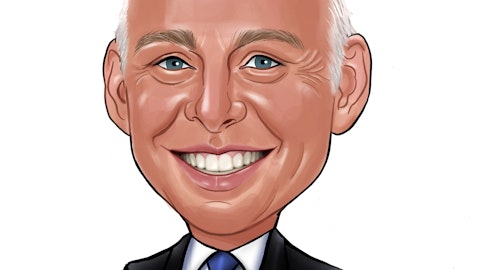Jonathan Porter: Yes. Andrew, this is Jonathan. Let me take a crack at that. So, I think the €“ you’re right. What we’re seeing in the flu data now is about the same level as the typical average flu season pre-pandemic. I guess the key difference is those deaths largely have appeared in Q4 as opposed to Q1. So it’s not that the absolute amount of the flu impact will be that different probably, but it just has occurred earlier, which is why we’ve adjusted our IBNR at the end of the quarter. And then that’s also the reason why we were talking about the pull-forward effect. So yes, I would expect, all else being equal to see lower seasonality in Q1. It doesn’t mean there’ll be zero seasonality because there are other things other than the flu, just the winter weather and other things affect mortality in the first quarter of the year too.
So, but the flu portion of it, we think, has been shifted to Q4. One other thing to keep in mind, of course, is as we switch accounting base fees, as Todd has talked about already today to LDTI that will again mean that the full experience impacts of any seasonality will be smoothed out largely over time, as well. So, that will also impact what shows up in Q1.
Andrew Kligerman: And with that new accounting will you share what the actual mortality is? Is that one of the disclosures that will be required under LDTI?
Todd Larson: Andrew, certainly, you’ll start seeing some more transparency on what’s going on with the underlying book of business including when we’ve updated in any material manner our underlying assumptions. So you’ll start seeing some of that transparency and we can talk to that going forward.
Operator: The next question comes from Alex Scott with Goldman Sachs. Please go ahead.
Alex Scott : Hi everyone. First one I had is just on the leadership changes. I was wondering and I appreciate we still have some time. I was wondering if you could sort of unpack the direction of the company and sort of how Tony fits into all of that high level as we think through that transition.
Anna Manning: Morning, Alex. Thanks for the question. I expect that Tony will continue our partnership approach. He will continue our solutions approach. I also believe he’ll continue to focus on technical expertise and strong risk management and risk culture. Tony has been with us for 25 years. He knows our people, our business. He knows our clients. He knows the industry really well. But rather than me answering the question for him, you’ll have many opportunities through the course of this year to hear directly from him. So including on these calls, he’ll be joining our call starting with the Q1 call and he will be at our Investor Day, which we are hosting in New York in the summer. And Tony and I will also spend the remaining 11 months of the transition going out to see our clients, to see investors, and you. So I €“ great question. Thank you. But I’ll leave it there and leave it for Tony to answer.
Alex Scott : Okay. Fair enough. Second one I had for you is, just on the sort of block transaction environment in the U.S., I mean we’ve heard from some companies that have had RBC impacts, whether it’s like legacy ULSG wallet type stuff or other impacts, I think, even relating to Be well in term life and things like that under principal-based reserving and so forth. So, I was just interested if you’re seeing any increased activity around that to help some of these companies optimize their balance sheets a bit?


